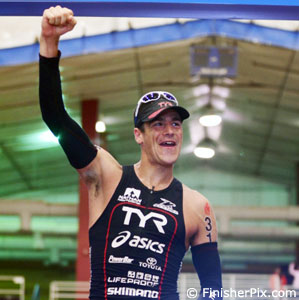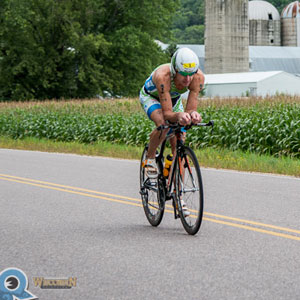Getting to know Brandon Marsh

Austin, TX based Pro Brandon Marsh had a very solid 2012 season and is now building up for a promising 2013. We had a few words with him about racing, training, cheating, drug testing and various other topics.
Slowtwitch: How was your start into the New Year?
Brandon: If by start you mean the New Year's Eve celebration, then it was very relaxed! We did a bit of training during the day, and then went to Alamo Draft House for dinner and an early show of Django! It's a 3-hour movie, so being triathletes we 'had' to watch the clock! We like movies, but don't typically go, so it was a good change of pace! I did make to midnight, but I think that I was asleep within 15 minutes after.
ST: Most professional triathletes can’t handle much alcohol. Is that true for you too?
Brandon: Yeah, it is. Even if you take away my straight-laced Baptist upbringing, I'm still about a drink a week kind of guy. I had a drink with dinner on NYE and always look for the drink a week box to check anytime something asks if I consume alcohol. Having said that, I do 'think' that I maintain my composure pretty well when I've had too many, but that is seldom! I suspect though that most people 'think' they do well when they've had a few too many. I am pretty sure that I don't just talk faster – I talk more.
ST: Talking about going faster, are you back to training in earnest?
Brandon: Yes, the schedule I received this week from Paulo said “Week 1”, so that's an indication that training has officially started. After IM Cozumel, I did what a lot of triathletes have a difficult time doing…I didn't log any workouts, I didn't follow a schedule of any sort, and I didn't 'train' at all 4-5 weeks. I think over the 4 weeks after Cozumel I was active on about 4 of those days!
ST: What is next on your schedule?
Brandon: My 2013 schedule is still a work in progress, and the question that I have to definitively answer is do I want to race in Kona before I retire…and if so, how can I get there to have my good race and do it without destroying myself in the process. I think that a lot of professionals simply focus on getting to Kona and don't look at how well they will (or won't) do once they get there, or what the real benefit to being there is. If you have a contract that takes the financial responsibility away then it can make good sense. If you're going to go 30th or something and spend $3k of your own money, then it might make better sense to do another race from a financial or even exposure point of view. But really, to each their own.
There are a lot races to pick from these days. I'm looking at several races and trying to align my race choices with my goals for the year. At this point in time, my first race of the season will most likely be 70.3 Texas in Galveston, not for the points or money, but because it's close to where I grew up and it's drivable distance. We also have a local sponsor who will put us up for the weekend. After that, likely 70.3 St. George or Rev3 Knoxville with the rest largely to be determined.
ST: When you plan out your season, do you synch it up with Amy, or is that a secondary thought?
Brandon: Amy usually has about 7 schedules planned, and they are usually laid out on various pieces of paper throughout the house. We like traveling to races together as well as training together for at least our warm-up! But, doing full-blown IM training together can be trying. So, the short answer is it is a mix. We will do the majority of our races together, usually 70.3s. But, using 2012 as an example, we both did IM Texas and then she did IM NYC and Kona, neither of which I raced. But, I did go to Kona as a sherpa. I raced Cozumel, she went as a sherpa. That one was tough because while she was on a break after Kona I was training, and while I was on a break after Cozumel, she was building up. 2013 will likely be a mix as well. I think that we are better balanced if we at least stagger some of the IM builds.
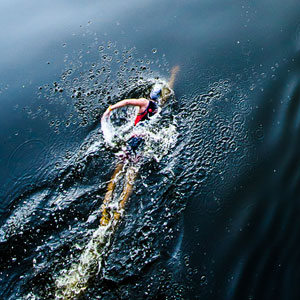
ST: The dilemma of spouses racing together sometimes brings up the issue of illegal assistance. Have you ever dealt with it either as a witness or being on the accused end?
Brandon: I'll try not to start a firestorm. I was told to check my moral compass after I blogged about the Miami incident as I wondered out loud if calling out Lisa publicly was the 'best' way to do things. But to answer the question, I have not been on the accused end of it. I have witnessed several incidents of what I considered questionable splits being given or support being given by coaches, significant others, etc.
I don't think that it is limited to partners, but the Miami incident at least brought more attention to it since it was so obvious. I think it goes beyond that. Is it 'ok' for a female pro to take a positional advantage that is similar to that at Miami 'if' it is situational with a slower or second tier male pro (or age grouper)? She's getting a similar advantage. At what point do athletes who have a history of sitting in or pushing the limits of drafting get called out or labeled as cheats? Some of the policing comes down on our shoulders. Some of it comes down to officials making the calls. In the day and age of real-time video via phones or social networking, if it's caught on video after the fact, would that be sufficient to levy a penalty or disqualification? In the case of Miami, a 'zero tolerance' policy on past doping convictions would have eliminated that one. Just throwing ideas out there.
ST: Appreciated. On a slightly better note, how is Austin treating you?
Brandon: I grew up in Texas and first raced in Austin probably around 1991 or so. At that time it was much smaller than it is now and considered a bit of a hippie liberal city. And, I moved here after college in 1998 for work. It is a great city, but it has become a massive city with huge suburbs! Even still, Austin really is the best city in Texas for training and being active. So, it is treating us well. We have a great local community of locally supportive businesses and athletes that make it a great place to be. As far as cities or metro areas in Texas, there really isn't anywhere else we'd like to be. Being a professional triathlete in Austin has its challenges, mainly with the cycling, but we make it work. We've not been in Texas the last 3 summers, so when the training gets going and the temperatures skyrocket, we have been in cooler climates.
ST: Have you considered moving elsewhere?
Brandon: We have. We spent this past summer, which turned into 5 months, in Flagstaff, AZ. Flagstaff was a very easy city to enjoy. There's no shortage of outdoor activity, and you can enjoy things year round since it is at altitude and doesn't get too hot in the summer and apparently doesn't get too snowed in during the winter. Flag would be #1 on our list of places to move. But, with both of us having our families here in Texas, I don't know if it's likely that we would make a permanent move. Family is important to us, and while making a move 'might' make the triathlon aspects of our lives easier in the short term, having family close by is important to both of us long term.
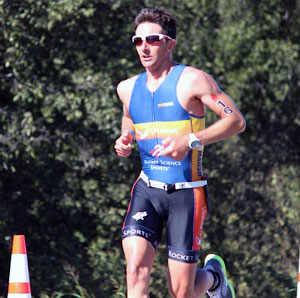
ST: Looking back at 2012 what comes to your mind?
Brandon: 2012 was a great year for a number of reasons. The end of 2011 was rough for us, and we made wholesale changes. We left TeamTBB and we were slated to be on another US team for 2012, but that didn't materialize even though a lot of work was put into it. I hired Paulo as a coach so that I could focus on waking up and executing my workouts without need to coach myself, and I put my coaching efforts into my athletes. Honestly, the results speak for themselves and it was a good year for both of us.
ST: Ironman recently announced the suspension of Brazilian Pro Ivan Albano who had been caught in an out of competition test. Is that giving you satisfaction or is it annoying to hear, or maybe a bit of both?
Brandon: I think that with doping, we are just seeing the 'tip of the iceberg' as some have said. And, I have no inside knowledge or basis for that comment other than my cynicism or skepticism or whatever. It is satisfaction in the sense that some of the athletes who try to cheat the system are being caught and that the system at least seems to be working. Since the introduction of WTC's testing program, there have been enough positives to show that doping is a problem. And, when you add to it the positives or at least questionable results in long course before WTC had an official published program and those from ITU racing, you can see that triathlon is certainly not exempt from doping.
It is annoying and bothersome in the sense that we really can't say that triathlon is exempt from doping, even at the age group level. And, the three professional positives from the WTC program have been athletes who were not consistently on the podium. That certainly isn't to imply that those consistently on the podium are any less clean. But, playing to cynicism or skepticism it just begs the question that 'if' these athletes are guilty, then how many others are there?
ST: How often have you been drug tested the last few years?
Brandon: I have been tested once ever, and that was after my 5th place finish at Ironman UK in August 2010. I began racing professionally in 2004. I did receive notice that I am in the USADA International Testing Pool for OOC testing for at least the first quarter of 2013.
ST: Is drug testing these days as advanced and as heavily pursued as bike technology, or is it a bit like early aero bars?
Brandon: Do you mean the actual testing or trying to beat the tests? Man, I have no idea. I haven't been a ardent follower of drug testing, results, tests, etc. until more recently. For obvious reasons, it has moved to the forefront much more lately. And, more recently I have followed things more closely because of the WTC's testing program and because of Amy's inclusion in the testing pool a couple of years ago. For testing in triathlon, it has historically been carried out by NGBs like USAT, and that testing has been 'generally' focused on the athletes in the ITU style of racing. Now WTC's testing program opens the door for more professionals with the possibility of being tested. As far as the testing technology, again I do not know. We can see from cycling and other sports that have regular testing that the technology has definitely advanced. The biological passport has, apparently, had an effect on cleaning up cycling. I think that triathlon is moving in the right direction. I also think that we have some work to do to make sure that it's a clean playing field for professionals as well as age groupers who are competing for championship spots. The ability to separate the age groupers who 'just' want to finish from those who want Kona/Championship spots is something that I think might be considered when talking about age group testing. But, it seems to come down to money really…testing is expensive and positives are not good for business, cycling fallout has shown that.
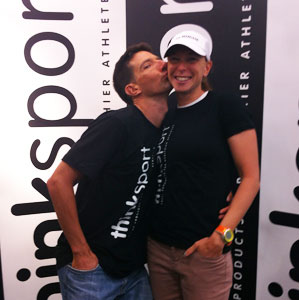
ST: A few months back we talked diet because to some degree you were a poster boy for Engine 2, but you no longer handle your diet like that. Can you share what you do now?
Brandon: Poster boy? Amy and I were part of a group of Austinites used as a pilot study for the book. So, we were to follow the diet to a tee for something like 6 weeks, we got a head start before and continued a little bit after as well. I believe that I'm quoted as saying “Performance starts with your fork” or something like that, and I think that making good nutritional choices does have an effect on your performance. But, talking about diet to a lot of folks is like talking about politics or religion. I'll gladly talk about it, but just remember we've all got our ideas. So, Engine2 for me (us) was an experiment that left me grumpy, skinny(er), hungry, and tired! For the first couple of months (I think we made it 3) it was good, then I was grumpy, skinny, hungry, and tired!
We eat a pretty whole foods diet and try to minimize the processed foods outside of training. We eat quite a bit of meat (beef, chicken, venison), eggs, vegetables and salads, sweet and white potatoes, and rice. Dark chocolate and ice cream are my go to sweets. Coffee. It doesn't have to be organic. We cook most of our meals and generally only eat out for maybe 3 meals a week.
For training though, I think that it is important to realize to fuel the workouts properly. And, if we're going to be away from food for a bit after a workout, we'll have a recovery drink of some type, but certainly not after every workout or even after every hard workout.
ST: Is there anything you absolutely won’t eat?
Brandon: Not really, I'll eat just about anything. I don't really make a practice of eating organ meats – they sound offal, even though I hear they are very nutritious.
ST: Talk about your sponsors.
Brandon: Sponsorship in triathlon is interesting, and at times it is a real challenge for us. Amy and I like to be 'packaged' together as we each have different strengths to offer our sponsors. Historically, I'm the more techy one of us and she's had higher results…but I'm doing my best to change that! Our title sponsor for 2012 and 2013 is Vitacost. Their slogan is “Taking the cost out of healthy living” and they have become what is essentially an online Whole Foods without the perishables. We write a weekly column for them about various fitness related topics. We have been riding Cervelo bikes since 2009, and 2013 will see us as part of the Cervelo team of athletes as well. Rocket Science Sports is a clothing and wetsuit company that started in Austin. They provide our wetsuits, swimwear, and custom race kits. In 2012 and 2013 we will be riding HED wheels and using their bars and extensions when needed. I've known John Cobb since about 1992 or so, and Cobb Cycling provides us with saddles. First Endurance really does offer a great suite of products for athletes and they are our race nutrition sponsor. We've been fortunate to have great local supporters in Austin Tri-Cyclist, Rogue Running, Soleus watches, and Thinksport for additional gear and equipment needs as well as Performance Wellness and Airrosti for our chiropractic, massage, and rehabilitation needs.
ST: Anything else we should know?
Brandon: I've got a degree in Chemical Engineering. I enjoy hunting and just being outside! This will be my 25th year of racing triathlons. Amy and I will have been married for 7years very soon. I get “interviewed” during all of my long rides, so it's good to finally chat with someone. I've got a brother who is an equine veterinarian.


